英语情态动词用法总结含答案百度文库
(完整版)情态动词详细用法归纳
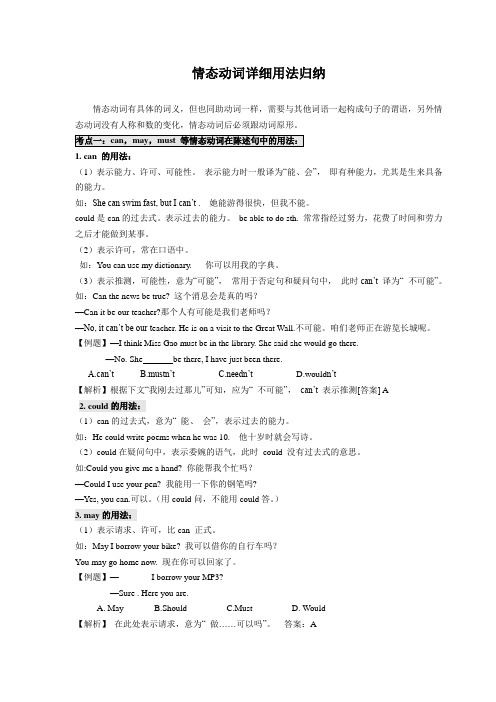
情态动词详细用法归纳情态动词有具体的词义,但也同助动词一样,需要与其他词语一起构成句子的谓语,另外情态动词没有人称和数的变化,情态动词后必须跟动词原形。
1. can 的用法:(1)表示能力、许可、可能性。
表示能力时一般译为“能、会”,即有种能力,尤其是生来具备的能力。
如:She can swim fast, but I can’t . 她能游得很快,但我不能。
could是can的过去式。
表示过去的能力。
be able to do sth. 常常指经过努力,花费了时间和劳力之后才能做到某事。
(2)表示许可,常在口语中。
如:You can use my dictionary. 你可以用我的字典。
(3)表示推测,可能性,意为“可能”,常用于否定句和疑问句中,此时can’t 译为“ 不可能”。
如:Can the news be true? 这个消息会是真的吗?—Can it be our teacher?那个人有可能是我们老师吗?—No, it can’t be our t eacher. He is on a visit to the Great Wall.不可能。
咱们老师正在游览长城呢。
【例题】—I think Miss Gao must be in the library. She said she would go there.—No. She be there, I have just been there.A.can’tB.mustn’tC.needn’tD.would n’t【解析】根据下文“我刚去过那儿”可知,应为“ 不可能”,can’t 表示推测[答案] A2. could的用法:(1)can的过去式,意为“ 能、会”,表示过去的能力。
如:He could write poems when he was 10. 他十岁时就会写诗。
(2)could在疑问句中,表示委婉的语气,此时could 没有过去式的意思。
英语情态动词用法总结(完整)
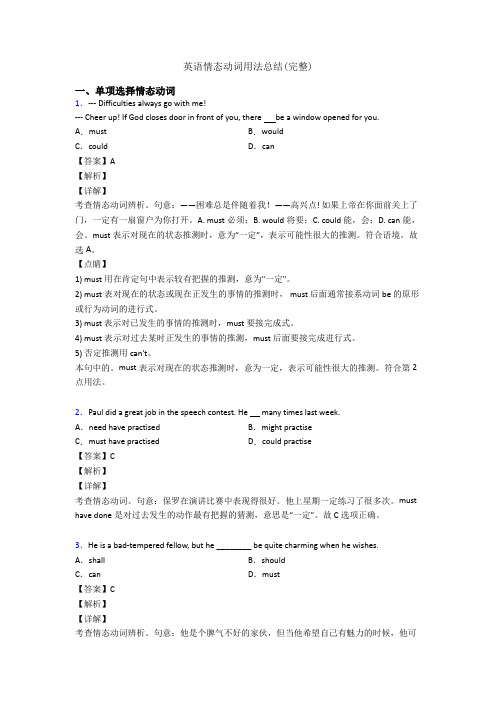
英语情态动词用法总结(完整)一、单项选择情态动词1.--- Difficulties always go with me!--- Cheer up! If God closes door in front of you, there be a window opened for you. A.must B.wouldC.could D.can【答案】A【解析】【详解】考查情态动词辨析。
句意:——困难总是伴随着我!——高兴点! 如果上帝在你面前关上了门,一定有一扇窗户为你打开。
A. must必须;B. would将要;C. could能,会;D. can能,会。
must表示对现在的状态推测时,意为“一定”,表示可能性很大的推测。
符合语境。
故选A。
【点睛】1) must用在肯定句中表示较有把握的推测,意为"一定"。
2) must表对现在的状态或现在正发生的事情的推测时, must 后面通常接系动词be 的原形或行为动词的进行式。
3) must 表示对已发生的事情的推测时,must 要接完成式。
4) must表示对过去某时正发生的事情的推测,must 后面要接完成进行式。
5) 否定推测用can't。
本句中的。
must表示对现在的状态推测时,意为一定,表示可能性很大的推测。
符合第2点用法。
2.Paul did a great job in the speech contest. He many times last week.A.need have practised B.might practiseC.must have practised D.could practise【答案】C【解析】【详解】考查情态动词。
句意:保罗在演讲比赛中表现得很好。
他上星期一定练习了很多次。
must have done是对过去发生的动作最有把握的猜测,意思是“一定”。
故C选项正确。
3.He is a bad-tempered fellow, but he ________ be quite charming when he wishes.A.shall B.shouldC.can D.must【答案】C【解析】【详解】考查情态动词辨析。
英语情态动词用法总结(完整)

英语情态动词用法总结(完整)一、单项选择情态动词1.--- Difficulties always go with me!--- Cheer up! If God closes door in front of you, there be a window opened for you. A.must B.wouldC.could D.can【答案】A【解析】【详解】考查情态动词辨析。
句意:——困难总是伴随着我!——高兴点! 如果上帝在你面前关上了门,一定有一扇窗户为你打开。
A. must必须;B. would将要;C. could能,会;D. can能,会。
must表示对现在的状态推测时,意为“一定”,表示可能性很大的推测。
符合语境。
故选A。
【点睛】1) must用在肯定句中表示较有把握的推测,意为"一定"。
2) must表对现在的状态或现在正发生的事情的推测时, must 后面通常接系动词be 的原形或行为动词的进行式。
3) must 表示对已发生的事情的推测时,must 要接完成式。
4) must表示对过去某时正发生的事情的推测,must 后面要接完成进行式。
5) 否定推测用can't。
本句中的。
must表示对现在的状态推测时,意为一定,表示可能性很大的推测。
符合第2点用法。
2.--- Oh, my God! I just missed the last bus back home.--- That’s really bad. I’m sure you ______ it, but you just didn’t hurry up.A.had caught B.could have caught C.could catch D.can catch【答案】B【解析】【详解】考查情态动词+have done结构。
句意:——哦,我的上帝!我刚好错过了回家的末班车。
——这是非常糟糕的。
初中英语情态动词详细用法归纳(含练习及答案)
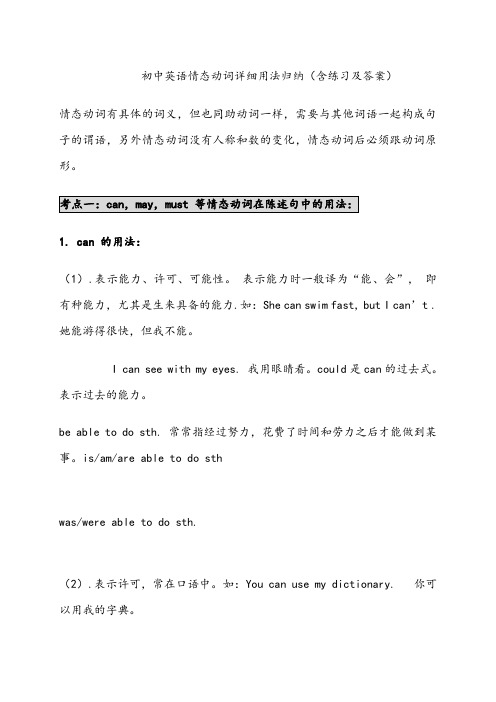
初中英语情态动词详细用法归纳(含练习及答案)情态动词有具体的词义,但也同助动词一样,需要与其他词语一起构成句子的谓语,另外情态动词没有人称和数的变化,情态动词后必须跟动词原形。
1. can 的用法:(1).表示能力、许可、可能性。
表示能力时一般译为“能、会”,即有种能力,尤其是生来具备的能力.如:She can swim fast, but I can’t . 她能游得很快,但我不能。
I can see with my eyes. 我用眼睛看。
could是can的过去式。
表示过去的能力。
be able to do sth. 常常指经过努力,花费了时间和劳力之后才能做到某事。
is/am/are able to do sthwas/were able to do sth.(2).表示许可,常在口语中。
如:You can use my dictionary. 你可以用我的字典。
(3).表示推测,可能性,意为“可能”,常用于否定句和疑问句中,此时can’t 译为“ 不可能”。
如:Can the news be true 这个消息会是真的吗—Can it be our teacher那个人有可能是我们老师吗—No, it can’t be our teacher. He is on a visit to the Great Wall.不可能。
咱们老师正在游览长城呢。
【例题】—I think Miss Gao must be in the library. She said she would go there. —No. She __be there, I have just been there. ’t ’t ’t ’t【解析】根据下文“我刚去过那儿”可知,应为“ 不可能”,can’t 表示推测[答案] Acould的用法:(1).can的过去式,意为“ 能、会”,表示过去的能力。
如:He could write poems when he was 10. 他十岁时就会写诗。
情态动词的用法(附练习及参考答案)
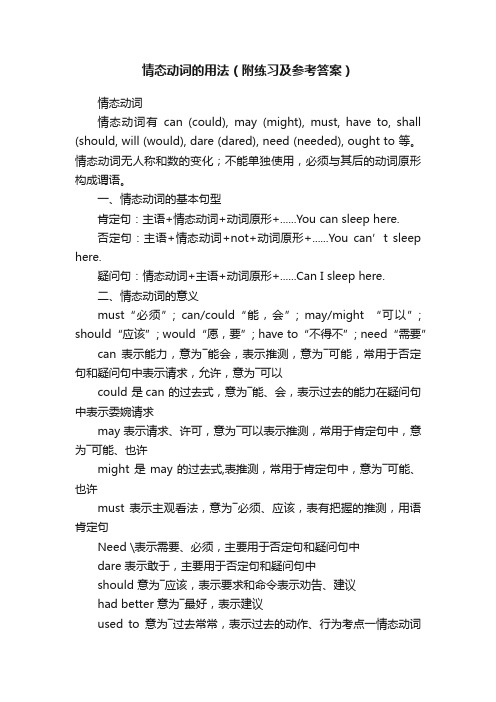
情态动词的用法(附练习及参考答案)情态动词情态动词有can (could), may (might), must, have to, shall (should, will (would), dare (dared), need (needed), ought to 等。
情态动词无人称和数的变化;不能单独使用,必须与其后的动词原形构成谓语。
一、情态动词的基本句型肯定句:主语+情态动词+动词原形+......You can sleep here.否定句:主语+情态动词+not+动词原形+......You can’t sleep here.疑问句:情态动词+主语+动词原形+......Can I sleep here.二、情态动词的意义must“必须”; can/could“能,会”; may/might “可以”; should“应该”; would“愿,要”; have to“不得不”; need“需要”can 表示能力,意为―能会,表示推测,意为―可能,常用于否定句和疑问句中表示请求,允许,意为―可以could 是can 的过去式,意为―能、会,表示过去的能力在疑问句中表示委婉请求may 表示请求、许可,意为―可以表示推测,常用于肯定句中,意为―可能、也许might 是may的过去式,表推测,常用于肯定句中,意为―可能、也许must 表示主观看法,意为―必须、应该,表有把握的推测,用语肯定句Need \表示需要、必须,主要用于否定句和疑问句中dare 表示敢于,主要用于否定句和疑问句中should 意为―应该,表示要求和命令表示劝告、建议had better 意为―最好,表示建议used to意为―过去常常,表示过去的动作、行为考点一情态动词情态动词有具体的词义,但也同助动词一样,需要与其他词语一起构成句子的谓语,另外情态动词没哟人称和数的变化,情态动词后必须跟动词原形。
三、情态动词的基本用法1. can 的用法(1)表示能力、许可、可能性。
(完整版)情态动词用法及其练习与答案
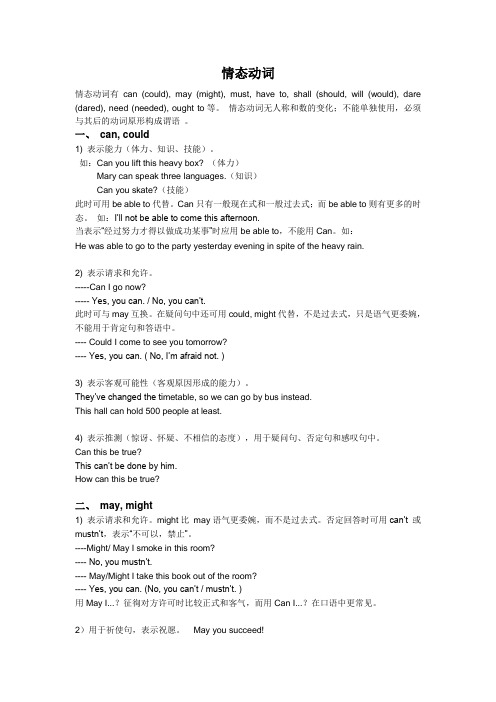
情态动词情态动词有can (could), may (might), must, have to, shall (should, will (would), dare (dared), need (needed), ought to等。
情态动词无人称和数的变化;不能单独使用,必须与其后的动词原形构成谓语。
一、can, could1) 表示能力(体力、知识、技能)。
如:Can you lift this heavy box? (体力)Mary can speak three languages.(知识)Can you skate?(技能)此时可用be able to代替。
Can只有一般现在式和一般过去式;而be able to则有更多的时态。
如:I’ll not be able to come this afternoon.当表示“经过努力才得以做成功某事”时应用be able to,不能用Can。
如:He was able to go to the party yesterday evening in spite of the heavy rain.2) 表示请求和允许。
-----Can I go now?----- Yes, you can. / No, you can’t.此时可与may互换。
在疑问句中还可用could, might代替,不是过去式,只是语气更委婉,不能用于肯定句和答语中。
---- Could I come to see you tomorrow?---- Yes, you can. ( No, I’m afraid not. )3) 表示客观可能性(客观原因形成的能力)。
They’ve changed the ti metable, so we can go by bus instead.This hall can hold 500 people at least.4) 表示推测(惊讶、怀疑、不相信的态度),用于疑问句、否定句和感叹句中。
初中英语情态动词详细用法归纳含练习及答案

初中英情用法(含及答案)考点一: can, may , must等情在述句中的用法:1. can 的用法:( 1).表示能力、可、可能性。
表示能力一般“能、会”,即有种能力,特别是生来具的能力 .如: She can swim fast, but I can’能她t.游得很快,但我不可以。
I can see with my eyes. 我用眼睛看。
could 是 can 的去式。
表示去的能力。
be able to do sth. 经常指努力,花了和力以后才能做到某事。
is/am/are able to do sthwas/were able to do sth.(2) .表示可,常在口中。
如: You can use my dictionary.你能够用我的词典。
( 3).表示推,可能性,意“可能”,常用于否认句和疑句中,此can’t“ 不可以能”。
如:Can the news be true? 个信息会是真的?— Can it be our teacher?那个人有可能是我老?— No, it can ’t be our teacher. He is on a visit to the Great Wall不可以.能。
咱老正在游城呢。
【例】— I think Miss Gao must be in the library. She said she would go there.—No. She __be there, I have just been there. A.can ’ t B.mustn ’ tC.needn ’ tD.wouldn ’t【分析】依据下文“我去那边”可知,“ 不可以能”,can’t表示推[答案] A could 的用法:(1).can 的去式,意“能、会”,表示去的能力。
如:He could write poems when he was 10. 他十就会写。
( 2) . could 在疑句中,表示委宛的气,此could 没有去式的意思。
情态动词用法归纳(全)

四、 dare, need
3) dare和 need作实义动词用时, 有人称、时态和数的变化。 在肯定句中,dare后面常接带to的不定式。在疑问句和否 认句中,dare后面可接带to或不带to的不定式。而need后 面只能接带to的不定式。
1. I dare to swim across this river.
----Can it be our teacher? 那个人有可能是我们老师吗?
----No, it can’t be our teacher. He is on a visit to the Great Wall. 不可能。咱们老师正在游览长城精呢品P。PT
例 --- I think Miss Gao must be in the library. She said she would go there. ----- No. She __ be there, I have just been there. A.can’t B.mustn’t C.needn’t D.wouldn’t
精品PPT
六、 will, would
• 3) would表示过去反复发生的动作或某种倾向。would表 示过去习惯时比used to正式,且没有“现已无此习惯〞的 含义。
• 1. During the vacation, he would visit me every other day.
• 2. The wound would not heal.
• 4) 表示估计和猜测。
• It would be about ten o’clock when she left home.
精品PPT
七、should, ought to
1) should, ought to表示“应该〞,ought to表示义务或责任, 比should语气重。
- 1、下载文档前请自行甄别文档内容的完整性,平台不提供额外的编辑、内容补充、找答案等附加服务。
- 2、"仅部分预览"的文档,不可在线预览部分如存在完整性等问题,可反馈申请退款(可完整预览的文档不适用该条件!)。
- 3、如文档侵犯您的权益,请联系客服反馈,我们会尽快为您处理(人工客服工作时间:9:00-18:30)。
英语情态动词用法总结含答案百度文库一、初中英语情态动词1.— We've ordered too much food. I eat any more.—Never mind. Let' take it home.A. can'tB. mustn'tC. needn'tD. shouldn't【答案】 A【解析】【分析】句意:——我们已经点了太多的食物,我不能再吃了。
——没关系,我们带回家吧。
can't不能;mustn't必须不;一定不要;needn't不必;shouldn't不应该。
根据句意可知选A。
【点评】考查情态动词辨析。
2.All passengers ______ go through safety check before they take a plane.A. canB. mayC. mustD. could【答案】 C【解析】【分析】句意:所有乘客登机前必须接受安全检查。
A. can能够,表示能力;B. may可以,表示许可;C. must必须;D. could可能,可以。
登机前必须安检。
故选C。
【点评】情态动词词义辨析。
以及can、may、must、could四个词的词义和用法。
3.— Sorry, I forgot to take money with me. Maybe I can't buy the book you like.— Mum, you ______ worry about it. We can pay by Alipay (支付宝).A. can'tB. needn'tC. mustn'tD. shouldn't【答案】 B【解析】【分析】句意:——对不起,我忘记带钱了。
也许我不能买你喜欢的书。
——妈妈,你不用担心。
我们可以用支付宝支付。
A. can't不能,指不允许或否定推测;B. needn't 不需,指没必要;C. mustn't不能,表禁止;D. shouldn't不应该,表建议。
根据句意语境,本句是说妈妈不需要担心,故答案为B。
【点评】考查情态动词。
理解句意并掌握情态动词的意义和用法区别。
4.—Life is becoming convenient with the Internet.—That's true! Almost everything ______ be done online.A. mustB. couldC. shouldD. can't【答案】 B【解析】【分析】句意:——生活正随着网络变得方便。
——那是真的。
几乎所有的事情可以在网上完成。
A必须,B可以,C将,D不能。
根据 Life is becoming convenient with the Internet. 生活正随着网络变得方便,可知应该是很多事情可以在网上完成,故选B。
【点评】考查情态动词。
注意理解和掌握情态动词的不同用法。
5.A hard-working man ______ become a great scientist, but a great scientist _______ be a hard-working man.A. can't; canB. may not; mustC. can't; mustD. may not; can【答案】 B【解析】【分析】句意:一个勤奋的人可能不会成为一位伟大的科学家,但是一位伟大的科学家一定是一个勤奋的人。
can't不可能,不会;can可能,能,会;may not 可能不;must 必须,一定;结合句意,可知,第一个空为“可能不”,第二个空为“一定”,故答案为B。
【点评】考查情态动词。
掌握情态动词表推测时的意义和用法。
6.—Shall we meet at the station at 9 a.m.?—In fact we ______. The train ______until 11a.m.A. needn't; will leaveB. needn't; won't leaveC. mustn't; leavesD. mustn't; doesn't leave【答案】 B【解析】【分析】句意:—我们上午9点在车站见面好吗?—事实上我们不需要。
火车直到11点才离开。
needn't情态动词,不需要,没必要;mustn't情态动词,不允许,语气强烈,本题含义只是“不需要”,并没有“禁止、不许”这样强烈的语义。
not...until...,意为“直到...才...”,表示将来发生的事情,所以使用一般将来时态的否定形式won't。
故选:B。
【点评】考查情态动词辨析,固定搭配not...until...。
一般将来时态。
7.Teenagers allowed to drive .A. should not beB. should be notC. not should be【答案】A【解析】【分析】句意:年轻人不应该被允许驾车。
Should是情态动词,其否定表达一般在在后面加副词not,故选A。
【点评】此题考查含有情态动词的被动语态的否定形式。
平时注意记忆情态动词的记忆和用法。
8.You be tired after walking for such a long time. Sit down and have a rest.A. canB. can'tC. mustn'tD. must【答案】 D【解析】【分析】句意:走了这么长时间你一定很累了。
坐下休息一下吧。
can能,能够,can't不能,对事物进行否定推测;mustn't一定不是,禁止,must一定,对事物进行肯定推测,根据after walking for such a long time,可以肯定你一定很累,所以是进行肯定推测,情态动词使用must,故选D。
【点评】此题考查情态动词。
弄清每个情态动词的使用规则,根据句意确定所使用的情态动词。
9.—Who it be that is knocking at the door?—It be father, but I'm not sure.A. call; mustB. can; mayC. must; canD. may; must【答案】 B【解析】【分析】句意:——敲门的人可能是谁呢?——他可能是父亲,但是我不确定。
第一空,can可能,表猜测用语疑问句形式,may是表可能;第二空,根据后面的but I'm not sure,可知表示不确定的猜测,应填may,故选B。
【点评】此题考查情态动词辨析。
先弄清每个情态动词的使用规则。
根据上下文的联系确定情态动词的使用。
10.I can't go with you. I _______ stay at home until my parents come back.A. canB. mayC. mustD. could【答案】 C【解析】【分析】句意:我不能和你一起去。
我必须呆在家直到我父母回来。
A. can能,表示能力;B. may可以,表示许可;C. must必须,强调主观愿望;D. could可以,表示允许、请求。
父母没回来前,我必须待在家。
故选C。
【点评】此题考查情态动词的用法。
11.Harry's been driving all day—— he be tired.A. needB. canC. shallD. must【答案】 D【解析】【分析】句意:哈利已经开了一整天车了——他一定累了。
根据句意可知,开了一整天车,所以推测他累是一定的。
所以用情态动词must。
故选D。
12.We __________ pay to get into the concert. It's free.A. can'tB. mustn'tC. might notD. don't have to【答案】 D【解析】【分析】句意:我们进入音乐会不必付钱。
这是免费的。
A.can"t 不可能; B. mustn"t 禁止; C.might not 可能不;D. don"t have to不必。
根据It's free.可知音乐会是免费的,因此不必付钱。
故选D。
13.—Must I clean the classroom now? —No, you_______.A. mustn'tB. can'tC. needn't【答案】 C【解析】【分析】句意:--我必须现在把教室打扫干净吗?--不,你不必。
must I do …?的否定回答是No, you needn't 或者 No , you don't have to 。
根据是否定回答,故选C。
14.He _________ work on the farm every day. I'm sure about that because his skin is very black.A. can'tB. mayC. mustD. couldn't【答案】 C【解析】【分析】句意:他一定每天在农场工作,我敢肯定,因为他的皮肤很黑。
A. can't不可能,对事情表示否定推测;B. may可以,可能;C. must一定、必须,表示非常肯定的推测;D. couldn't不能。
根据I'm sure about that because his skin is very black.可知他是在农场上工作,此处表示肯定的推测,故选C。
【点评】此题考查情态动词。
要掌握每个情态动词的使用方法。
15.—We've got everything ready for the picnic.—Do you mean I __________ bring anything with me?A. can'tB. mustn'tC. couldn'tD. needn't【答案】 D【解析】【分析】句意:—我们已经为野餐准备好了一切。
—你的意思是我不必带任何东西吗?A. can't 不能;B. mustn't 表示禁止,一定不要;C. couldn't不能,表示过去时态;D. needn't不必。
